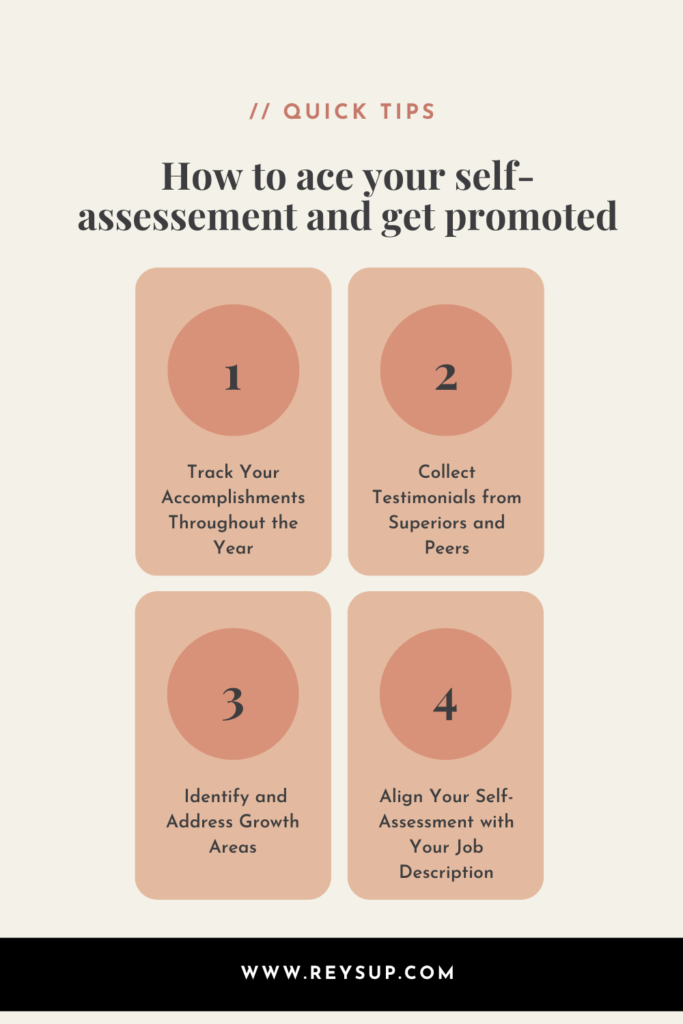Mastering the Self-Assessment: Powerful Phrases to Skyrocket Your Career
Let’s face it. Most people dread writing self assessments. They are time consuming, require a ton of organization and planning, and can be stressful. That said, self assessments are a crucial part of the processional development process, and many times offer employees an opportunity to not only reflect on their performance, but showcase their achievements to management. All in all – self assessments are a good thing and should be taken seriously.
Some companies will conduct multiple self-assessments throughout the year, but most organizations will save the more comprehensive ones for the end of the year review cycle. It is often the case that these end of year cycles determine promotions, raises, and organization changes for the coming year, so it’s important to be prepared.
In this post, we are sharing some key phrases that you can use in your next self assessment write up to make sure you really stand out to your manager. We understand that writing these assessments can be time-consuming, so our goal is to offer you ready-to-use phrases that you can easily personalize for your specific situations and streamline the process for you. Let’s get into it!

Mastering the self-assessment: How to Prepare
Before we get into the actual phrases, it’s important to note that a strong self-assessment requires advance preparation. It’s not enough to just sit down the night before the assessment is due and try to recall everything you’ve accomplished. You will most definitely forget something, and your assessment won’t be as compelling as it could be.
Instead, your self-assessment should be the culmination of thoughtful tracking, collecting feedback, and aligning your performance with company expectations. Here are four simple strategies to prepare effectively.

1. Track Your Accomplishments Throughout the Year
As mentioned, it’s really easy to forget some of your key achievements, especially is you are in a more generalist role where you take on a variety of different roles and projects.
For this reason, it’s a good idea to create an accomplishment tracker at the start of the year that you fill in as time goes by. Remember, a successful self-assessment should not only focus on your accomplishments, but the impact they’ve had on the business. As the year progresses, document each major project, task, or responsibility, and make a habit of noting what you did and how it contributed to the organization or team’s success. For example, if you implemented a new system that improved efficiency, note the specific time savings or cost reductions it led to.
Example:
- Accomplishment: Improved the client onboarding process by implementing a new project management software.
- Impact: Reduced onboarding time by 25%, resulting in faster client engagement and increased customer satisfaction.
2. Collect Testimonials from Superiors and Peers
In addition to keeping your personal tracker, you should also try and get testimonials from colleagues, amagers, or even clients. These ‘external’ voices can provide validation of your contributions and speak to your work quality. Instead of waiting until the last minute, aim to collect feedback throughout the year, and always ask to get it in written form if possible.
Example:
- “My manager, [XX], commended my ability to manage multiple projects simultaneously and consistently deliver results on time.”
3. Identify and Address Growth Areas
While it’s important to highlight your achievements, a strong self-assessment also demonstrates your ability to self-reflect and recognize areas for growth. There is no doubt that managers value employees who show a growth mindset—those who are aware of their weaknesses and are actively working to improve.
Rather than simply listing areas where you fell short, focus on how you’ve already begun to address these issues and discuss what steps you’ve taken to develop new skills or improve existing ones.
Example:
- “About half way through the year, I realized that my public speaking skills needed improvement, so I attended a workshop on presentation skills and have since noticed an improvement in my ability to present complex ideas to clients.”
4. Align Your Self-Assessment with Your Job Description
Don’t forget that your job description! It’s a powerful tool to use in self assessments because it provides a clear set of expectations and responsibilities for your role. Before you write your self-assessment, review the JD to ensure you’re addressing the key competencies and performance metrics outlined by your organization. Management will be looking for evidence that you are fulfilling—and hopefully exceeding—their expectations in your current role.
Example:
- “As part of my responsibilities of project management, I successfully led a cross-functional team on the [XX] initiative, ensuring the project was completed ahead of schedule and within budget.”
Mastering the Self-Assessment: Key Competencies and Suggested Phrases To Use in Your Self-Assessment
Now let’s get into the actual phrases you can use in your self- assessment. It’s general, it’s a good idea to provide evidence of/or comment on competencies that are relevant to your role. Below we provide a handful of the most common competencies, but make sure to pick those that are most relevant to the work you are doing.
1. Problem Solving
- Powerful phrases to use:
- “I consistently identify and address challenges, as evidenced by my work on [XX project], where I streamlined [XX process] and reduced [XX inefficiency].”
- “I approach problems with a solutions-oriented mindset, leveraging both data and cross functional team feedback to deliver results.”
- “I proactively addressed [XX issue] by introducing [XX solution], which improved [XX metric] by [XX percentage].”
- Avoid talking points that imply the below:
- “Sometimes when I solve problems, I’m not always sure of the best approach so I make sure to collaborate with teammates to develop a plan.”
- “I’m good at fixing issues when they come up, but I don’t actively seek them out.”
- “I rely on others to guide me when dealing with difficult problems.”
2. Data Analysis
- Powerful phrases to use:
- “I utilized data to drive key decisions in [XX project], which resulted in a [XX percent] increase in efficiency.”
- “I leveraged my ability to analyze and interpret complex data to provide actionable insights for [XX team], contributing to improved [XX result].”
- “I continuously seek out opportunities to refine my data analysis skills, ensuring my recommendations to the broader organization are informed and accurate.”
- Avoid talking points that imply the below:
- “I sometimes use data, but I rely more on intuition.”
- “I tend to delegate work that involves analyzing complex data to other more data-focused teams.”
- “I haven’t had much opportunity to work with data in my role.”
3. Getting Scrappy/Creative
- Powerful phrases to use:
- “Given the limited resources that were available, I demonstrated creativity by finding alternative solutions to the [XX problem], such as [XX example], which saved the team [XX time/money].”
- “I thrive in situations that require resourcefulness and scapiness and I am constantly finding new ways to solve unique challenges and meet aggressive deadlines.”
- “I proactively sought out innovative approaches when tackling [XX problem], resulting in a more efficient process.”
- Avoid talking points that imply the below:
- “I tend to rely on tried-and-true methods rather than exploring creative options.”
- “I’m resourceful when necessary, but I prefer to work with fully developed resources.”
- “I struggle to find creative solutions under pressure. I like to take my time with my work”
4. Driving Efficiencies on the Team
- Powerful phrases to use:
- “I led the [XX initiative] to streamline [XX process], reducing time spent by [XX percent] and allowing the team to focus on more strategic work.”
- “By implementing [XX tool], I improved team productivity and reduced bottlenecks in [XX process].”
- “I consistently seek opportunities to enhance efficiency on the team and always find myself aiming to give back time to the team.”
- Avoid talking points that imply the below:
- “I try to improve efficiency, but some processes are still slow because this is a startup.”
- “I’ve made small improvements, but we haven’t seen major gains yet.”
- “I help out with efficiency projects when needed, but it’s not my main focus.”
5. Collaboration/Teamwork
- Powerful phrases to use:
- “I actively foster collaboration across teams, which has led to [XX successful outcome] on [XX project].”
- “I value open communication and work to ensure alignment between departments, which helped avoid [XX issue] and improve efficiency.”
- “I am a reliable team player, frequently offering support and constructive feedback to my peers.”
- Avoid talking points that imply the below:
- “I work well with my team but often prefer to work independently.”
- “I collaborate when required, but I don’t always initiate it.”
- “I actively contribute to team projects, but I sometimes find it challenging to keep everyone aligned due to the many tasks we’re managing simultaneously.”
6. Project Management/Organization
- Powerful phrases to use:
- “I successfully managed [XX project], ensuring we met all deadlines, stayed within budget, and exceeded [XX client’s} expectations.”
- “I used my organizational skills to juggle multiple projects at once [such as XX and XX], and prioritized tasks based on impact to ensure everything was completed on time.”
- “By creating a clear project plan, I kept the team aligned and on schedule, resulting in a successful project outcome.”
- Avoid talking points that imply the below:
- “I manage projects, but I sometimes struggle with meeting deadlines because the deadlines are unreasonable here.”
- “I try to stay organized, but I occasionally lose track of tasks because I’m constantly bombarded with asks.”
7. Communication
- Powerful phrases to use:
- “I effectively communicate with both internal and external stakeholders, ensuring that everyone is aligned on goals and expectations.”
- “I have improved my communication skills over the past year by actively seeking feedback from my peers and refining how I present complex ideas. Here are a few specific ways I did this [XX, XX, and XX].”
- “I proactively share updates with the team to keep everyone informed and to avoid misunderstandings before they happen.”
- Avoid talking points that imply the below:
- “I share updates when necessary but could improve on keeping everyone in the loop.”
- “I communicate well with my immediate team but struggle with cross-departmental communication.”
- “I sometimes find it difficult to explain complex ideas in a way that everyone understands because some people on the team aren’t as good at [X].”
8. Leadership and Mentorship
- Powerful phrases to use:
- “I took on more of a leadership role in [XX project]. I ensured the team completed [XX tasks], quarterbacked coordination amongst everyone, and ultimately ensured we met all deadlines with strong deliverables.”
- “I actively mentor junior colleagues, providing them with guidance and support that has helped them grow in their roles.”
- “I seek out leadership opportunities and work to develop my own leadership skills by attending workshops and seeking feedback from peers. Some examples of this include [XX and XX]”
- Avoid talking points that imply the below:
- “I’m not in a leadership position, so I haven’t had many opportunities to demonstrate leadership.”
- “I provide some informal mentorship, but I haven’t taken on any formal mentorship roles.”
How Self-Assessments Can Propel Your Career
Although self assessments can be a source of stress for many, just remember they are just more or less a well written reflection of your past year’s work. And even though self-assessments can be annoying to write, if you view them as a valuable opportunity to showcase your strengths and highlight your accomplishments, you might develop a newfound appreciation for the process. This is your chance to build that bullet proof case for your promotion, and by completing a self-assessment you are one step closer to getting it. Just remember to demonstrate you alignment with company goals, ask for peer feedback, and anchor everything you say in ‘impact to the business’. And by using the right language and phrases provided here today, you can make a strong case for your continued success and growth within your organization. Good luck!
If you enjoyed this article, make sure to check out our other related article on how to determine if you are an overperformer. If you are gunning for a promotion this year, this is a must read article!




